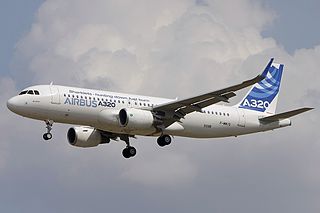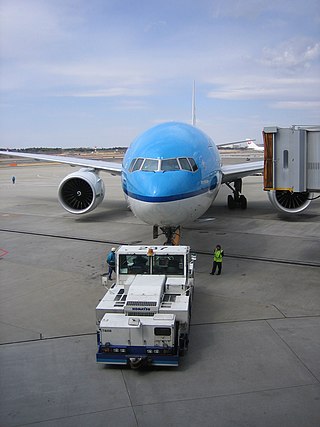Deutsche Lufthansa AG, or simply Lufthansa, is the flag carrier of Germany. When combined with its subsidiaries, it ranks second in Europe for passengers carried, largest in Europe and fourth largest in the world by revenue. Lufthansa is also one of the five founding members of Star Alliance, which is the world's largest airline alliance, formed in 1997. Lufthansa was founded in 1953 and commenced operations in April 1955.

The Boeing 737 is an American narrow-body airliner produced by Boeing at its Renton factory in Washington. Developed to supplement the Boeing 727 on short and thin routes, the twinjet retained the 707 fuselage width and six abreast seating but with two underwing Pratt & Whitney JT8D low-bypass turbofan engines. Envisioned in 1964, the initial 737-100 made its first flight in April 1967 and entered service in February 1968 with Lufthansa. The lengthened 737-200 entered service in April 1968, and evolved through four generations, offering several variants for 85 to 215 passengers.

The Airbus A320 family is a series of narrow-body airliners developed and produced by Airbus. The A320 was launched in March 1984, first flew on 22 February 1987, and was introduced in April 1988 by Air France. The first member of the family was followed by the stretched A321, the shorter A319, and the even shorter A318 . Final assembly takes place in Toulouse in France; Hamburg in Germany; Tianjin in China since 2009; and Mobile, Alabama in the United States since April 2016.

The Airbus A340 is a long-range, wide-body passenger airliner that was developed and produced by Airbus. In the mid-1970s, Airbus conceived several derivatives of the A300, its first airliner, and developed the A340 quadjet in parallel with the A330 twinjet. In June 1987, Airbus launched both designs with their first orders and the A340-300 took its maiden flight on 25 October 1991. It was certified along with the A340-200 on 22 December 1992 and both versions entered service in March 1993 with launch customers Lufthansa and Air France. The larger A340-500/600 were launched on 8 December 1997; the A340-600 flew for the first time on 23 April 2001 and entered service on 1 August 2002.

The Airbus A321 is a member of the Airbus A320 family of short to medium range, narrow-body, commercial passenger twin engine jet airliners; it carries 185 to 236 passengers. It has a stretched fuselage which was the first derivative of the baseline A320 and entered service in 1994, about six years after the original A320. The aircraft shares a common type rating with all other Airbus A320-family variants, allowing A320-family pilots to fly the aircraft without the need for further training.
Condor Flugdienst GmbH, is a German airline based in Neu Isenburg, Hesse, Germany. It was established in 1955 with Frankfurt Airport as its main base. Condor offers scheduled flights and operates, from Germany, medium-haul flights to the Mediterranean Basin and the Canary Islands as well as long-haul flights to destinations in Africa, Asia, North America, South America and the Caribbean. Whereas medium-haul flights are operated from many German airports and Zurich, long-haul flights usually depart from Frankfurt, with a few rotations operated from Düsseldorf and Munich. Condor also operates air charters.
Luxair, legally Luxair S.A., Société Luxembourgeoise de Navigation Aérienne, is a flag carrier of Luxembourg with its headquarters and hub at Luxembourg Airport. It operates scheduled services to destinations in Europe, North Africa, the Mediterranean and the Middle East with additional charter and seasonal services. It is Luxembourg's only passenger-carrying airline offering regular, non-charter service.
LATAM Airlines Chile, formerly known as LAN Chile and LAN Airlines, is a Chilean multinational airline based in Santiago and one of the founding companies of the LATAM Airlines Group, the largest airline holding company in Latin America. Its main hub is in the Arturo Merino Benítez International Airport in Santiago, with secondary hubs in São Paulo, Lima, Bogotá, Quito, Guayaquil and Asunción.
Air Algérie SpA is the flag carrier of Algeria, with its head office in the Immeuble El-Djazair in Algiers. With flights operating from Houari Boumedienne Airport, Air Algérie operates scheduled international services to 39 destinations in 28 countries in Europe, North America, Africa, Asia, and the Middle East, as well as domestic services to 32 airports. As of December 2013, Air Algérie was 100% owned by the Government of Algeria.

Israel Aerospace Industries, is Israel's major aerospace and aviation manufacturer, producing aerial and astronautic systems for both military and civilian usage. It has 14,000 employees as of 2021. IAI is state-owned by the government of Israel.

The Airbus A220 is a family of five-abreast narrow-body airliners by Airbus Canada Limited Partnership (ACLP). It was originally developed by Bombardier and had two years in service as the Bombardier CSeries. The program was launched on 13 July 2008. The smaller A220-100 made its maiden flight on 16 September 2013, received an initial type certificate from Transport Canada on 18 December 2015, and entered service on 15 July 2016 with launch operator Swiss Global Air Lines. The longer A220-300 first flew on 27 February 2015, received an initial type certificate on 11 July 2016, and entered service with airBaltic on 14 December 2016.
Oman Air is the flag carrier of Oman. Based at Muscat International Airport in Muscat, it operates domestic and international passenger services, as well as regional air taxi and charter flights.
Austrian Airlines AG, often shortened to Austrian or AUA, is the flag carrier of Austria and a subsidiary of Lufthansa, the flag carrier of the Federal Republic of Germany. The airline is headquartered on the grounds of Vienna International Airport in Schwechat where it also maintains its hub. As of July 2016, the airline flew to six domestic and more than 120 international year-round and seasonal destinations in 55 countries and is a member of the Star Alliance.

In aviation, pushback is an airport procedure during which an aircraft is pushed backwards away from its parking position, usually at an airport gate by external power. Pushbacks are carried out by special, low-profile vehicles called pushback tractors or tugs.

A narrow-body aircraft or single-aisle aircraft is an airliner arranged along a single aisle, permitting up to 6-abreast seating in a cabin less than 4 metres (13 ft) in width. In contrast, a wide-body aircraft is a larger airliner usually configured with multiple aisles and a fuselage diameter of more than 5 metres (16 ft), allowing at least seven-abreast seating and often more travel classes.

The competition between Airbus and Boeing has been characterized as a duopoly in the large jet airliner market since the 1990s.

WheelTug is a company known for its in-wheel electric taxiing system for airplanes. They are headquartered in the Isle of Man and have manufacturing facilities in Baltimore, Maryland.

The Airbus A320neo family is an incremental development of the A320 family of narrow-body airliners produced by Airbus. The A320neo family is based on the enhanced variant of the previous generation A319, A320, and A321, which was then retrospectively renamed the A320ceo family.

An Electric Green Taxiing System (EGTS) is an electric taxiing system which allows aircraft to taxi and pushback without requiring the use of aircraft engines or a pushback tractor, and is designed to reduce fuel volumes used by aircraft and reduce greenhouse gas emissions during ground operations. EGTS technology enables aircraft to avoid using their main engines during taxiing and instead taxi autonomously under their own electrical power, using the Auxiliary Power Unit (APU) generator. The system is designed for single-aisle aircraft, such as the Airbus A320 and the Boeing 737.

Ellinair was a Greek airline headquartered in Thessaloniki operating scheduled and charter flights.













